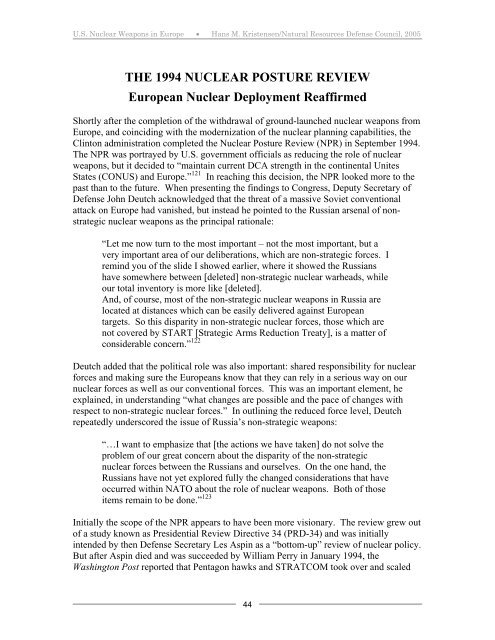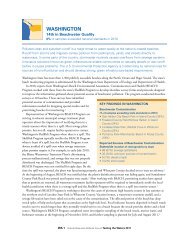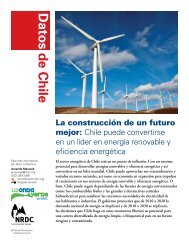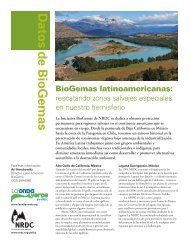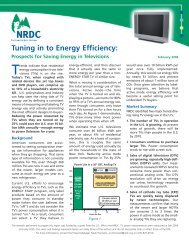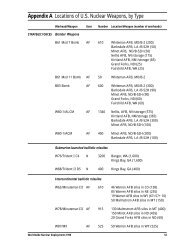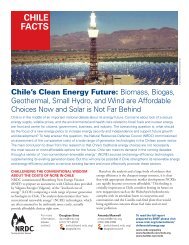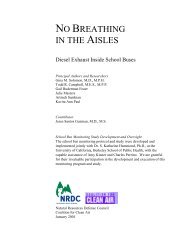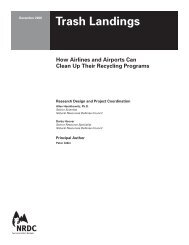US Nuclear Weapons in Europe - Natural Resources Defense Council
US Nuclear Weapons in Europe - Natural Resources Defense Council
US Nuclear Weapons in Europe - Natural Resources Defense Council
Create successful ePaper yourself
Turn your PDF publications into a flip-book with our unique Google optimized e-Paper software.
U.S. <strong>Nuclear</strong> <strong>Weapons</strong> <strong>in</strong> <strong>Europe</strong> • Hans M. Kristensen/<strong>Natural</strong> <strong>Resources</strong> <strong>Defense</strong> <strong>Council</strong>, 2005<br />
THE 1994 NUCLEAR POSTURE REVIEW<br />
<strong>Europe</strong>an <strong>Nuclear</strong> Deployment Reaffirmed<br />
Shortly after the completion of the withdrawal of ground-launched nuclear weapons from<br />
<strong>Europe</strong>, and co<strong>in</strong>cid<strong>in</strong>g with the modernization of the nuclear plann<strong>in</strong>g capabilities, the<br />
Cl<strong>in</strong>ton adm<strong>in</strong>istration completed the <strong>Nuclear</strong> Posture Review (NPR) <strong>in</strong> September 1994.<br />
The NPR was portrayed by U.S. government officials as reduc<strong>in</strong>g the role of nuclear<br />
weapons, but it decided to “ma<strong>in</strong>ta<strong>in</strong> current DCA strength <strong>in</strong> the cont<strong>in</strong>ental Unites<br />
States (CON<strong>US</strong>) and <strong>Europe</strong>.” 121 In reach<strong>in</strong>g this decision, the NPR looked more to the<br />
past than to the future. When present<strong>in</strong>g the f<strong>in</strong>d<strong>in</strong>gs to Congress, Deputy Secretary of<br />
<strong>Defense</strong> John Deutch acknowledged that the threat of a massive Soviet conventional<br />
attack on <strong>Europe</strong> had vanished, but <strong>in</strong>stead he po<strong>in</strong>ted to the Russian arsenal of nonstrategic<br />
nuclear weapons as the pr<strong>in</strong>cipal rationale:<br />
“Let me now turn to the most important – not the most important, but a<br />
very important area of our deliberations, which are non-strategic forces. I<br />
rem<strong>in</strong>d you of the slide I showed earlier, where it showed the Russians<br />
have somewhere between [deleted] non-strategic nuclear warheads, while<br />
our total <strong>in</strong>ventory is more like [deleted].<br />
And, of course, most of the non-strategic nuclear weapons <strong>in</strong> Russia are<br />
located at distances which can be easily delivered aga<strong>in</strong>st <strong>Europe</strong>an<br />
targets. So this disparity <strong>in</strong> non-strategic nuclear forces, those which are<br />
not covered by START [Strategic Arms Reduction Treaty], is a matter of<br />
considerable concern.” 122<br />
Deutch added that the political role was also important: shared responsibility for nuclear<br />
forces and mak<strong>in</strong>g sure the <strong>Europe</strong>ans know that they can rely <strong>in</strong> a serious way on our<br />
nuclear forces as well as our conventional forces. This was an important element, he<br />
expla<strong>in</strong>ed, <strong>in</strong> understand<strong>in</strong>g “what changes are possible and the pace of changes with<br />
respect to non-strategic nuclear forces.” In outl<strong>in</strong><strong>in</strong>g the reduced force level, Deutch<br />
repeatedly underscored the issue of Russia’s non-strategic weapons:<br />
“…I want to emphasize that [the actions we have taken] do not solve the<br />
problem of our great concern about the disparity of the non-strategic<br />
nuclear forces between the Russians and ourselves. On the one hand, the<br />
Russians have not yet explored fully the changed considerations that have<br />
occurred with<strong>in</strong> NATO about the role of nuclear weapons. Both of those<br />
items rema<strong>in</strong> to be done.” 123<br />
Initially the scope of the NPR appears to have been more visionary. The review grew out<br />
of a study known as Presidential Review Directive 34 (PRD-34) and was <strong>in</strong>itially<br />
<strong>in</strong>tended by then <strong>Defense</strong> Secretary Les Asp<strong>in</strong> as a “bottom-up” review of nuclear policy.<br />
But after Asp<strong>in</strong> died and was succeeded by William Perry <strong>in</strong> January 1994, the<br />
Wash<strong>in</strong>gton Post reported that Pentagon hawks and STRATCOM took over and scaled<br />
44


